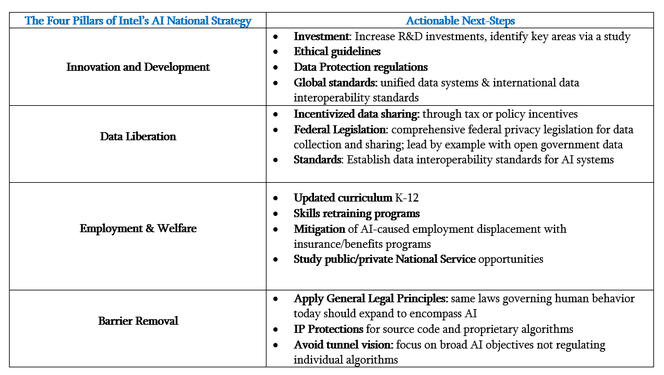National AI Debate: Intel Calls for Details, Budgets, in Response to White House Initiative

The Trump Administration’s release last month of the “American AI Initiative,” aimed at prioritizing federal R&D investments in machine intelligence, has stirred major debate in Washington and the technology industry. Intel has jumped into the discussion, issuing a lengthy reaction to the White House order that, in common with other responses, calls for more details and for spending commitments.
“It’s time for the U.S. to bet big on AI by building on the Executive Order to develop and adopt a National AI Strategy that includes specific measures to support and promote AI development and deployment,” Intel said. “A comprehensive national AI strategy would earmark funding and resources for AI research and development, outline clear goals and accountability mechanisms, identify and remove barriers, drive public and private development and adoption of AI, and outline a program to mitigate negative or unintended consequences.”
The Administration’s broadly drawn order (see “White House Launches AI Initiative”) calls for efforts “to sustain and enhance the scientific, technological, and economic leadership position of the United States in AI R&D and deployment,” and is intended to align early AI investments by federal science and technology agencies, including the Defense Advanced Research Projects Agency (DARPA) and the National Science Foundation (NSF), with industry efforts. The plan also seeks to increase access to federal data and HPC resources, as well as workforce training programs to develop “AI-relevant skills,” such as $30 million in research grants under a program called “Future of Work at the Human-Technology Frontier.”
An impetus for the White House initiative is China’s “Next Generation Artificial Intelligence Development Plan,” issued in 2017, which has raised American national security and global business competitiveness concerns. Critics of the White House initiative point out that various states and cities in China have committed more than $20 billion to AI research.
A key aspect of Intel’s recommended strategy is for the federal government, beyond making budget commitments to AI development, to serve as a focal point for AI policies both within federal agencies and technology companies.
“As AI is adopted, implementation of federal policies will be critical to help ensure the most effective and responsible use of AI,” Intel said, “setting in place clear ethical frameworks to guide development, and educating the public for better understanding of the uses and benefits of this technology. Mandated adoption of AI systems throughout the government will enable the advancement of AI and serve as a convener of best practices among multiple stakeholders, including academia, industry and civil society. Positioned as a hub for information and skills sharing, the government can expand AI development and adoption through public-private collaboration and cross-sector partnerships. This will enable the U.S. to develop and deploy AI technology more quickly throughout the economy.”
Other highlights of the Intel plan include:
Data Policy
Noting that as access increases to reliable data “the more ‘intelligent’ AI systems become,” Intel said the need for data “must be coupled with privacy protections and comprehensive ethical measures.”
“The adoption of comprehensive federal privacy legislation, and policies that require accountability for ethical design and implementation, are critical to ensuring protections are in place for efficient data sharing practices that mitigate potential individual and societal harm. With these policy protections in place data sharing can be a benefit, not a burden. Increased access to government data sources in machine readable formats across borders and jurisdictions will provide AI practitioners with a wide variety of data to help train AI systems. The adoption of international data interoperability standards will help speed the development and adoption of AI systems, and increase the efficiency of data sharing processes.”
Ultimately, Intel said, government-led establishment of data standards will “increase willingness and comfort with sharing information with the public and private sectors... The government can also increase the inclination to share data by investing in privacy-preserving AI research, which allows academic and industrial labs access to training data while protecting it from being reverse engineered.”
Employment and Training
As AI impacts and changes the worlds of business and work, Intel stated that “a multifaceted effort is needed to put the U.S. on a fast track to ensure AI employment opportunities and upward mobility for U.S. citizens.” Government, Intel said, “needs to invest in the development of a workforce that creates AI, cultivate a workforce that uses AI, and mitigate potential negative impacts of AI-caused employment displacement.”
This requires federal and local government agencies to study AI’s impact on the American workforce and then, “in collaboration with industry, can implement targeted initiatives and programs to help develop the workforce and alleviate job transitions and loss.”
“…an AI economy will require a new approach to our nation’s education system,” Intel said. “This approach includes an overhaul of the educational curriculum to focus on critical thinking and complex problem-solving skills. Dedicated federal funding for grants, scholarships, and fellowships focused on building AI skillsets will also increase opportunities to develop and sustain an AI workforce.”
Legal and Regulatory Reform
Another portion of the Intel plan is to revamp “the existing regulatory and policy landscape to identify and remove any barriers to the development and adoption of AI, while legislation and policies that help promote the responsible and ethical development of AI should be advanced.”
The goal is achieving a balance between proliferation of AI while also building “a safe environment where government and industry work in tandem. Government should avoid requiring companies to transfer or provide access to technologies, source code, algorithms or encryption keys as conditions of doing business, and support the use of all available tools, including trade agreements and diplomacy, to achieve these ends.”
“The U.S. faces a great opportunity with AI to increase global competitiveness, improve the quality of life for the citizenry, and maintain its leadership stance on the world stage,” Intel said. “Fostering innovation and development of AI, encouraging responsible data sharing, creating employment opportunities, and easing regulatory hurdles will ensure a U.S. big bet on AI will pay off in multitudes.”











